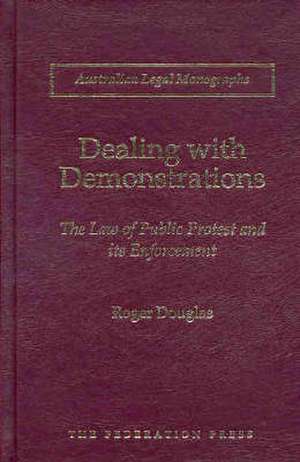Dealing with Demonstrations: The Law of Public Protest and Its Enforcement: Australian Legal Monograph S.
Autor Roger Douglasen Limba Engleză Hardback – 30 apr 2004
Preț: 291.89 lei
Preț vechi: 762.47 lei
-62% Nou
Puncte Express: 438
Preț estimativ în valută:
55.85€ • 58.32$ • 46.12£
55.85€ • 58.32$ • 46.12£
Carte indisponibilă temporar
Doresc să fiu notificat când acest titlu va fi disponibil:
Se trimite...
Preluare comenzi: 021 569.72.76
Specificații
ISBN-13: 9781862874879
ISBN-10: 1862874875
Pagini: 159
Greutate: 0 kg
Editura: Federation Press
Seria Australian Legal Monograph S.
ISBN-10: 1862874875
Pagini: 159
Greutate: 0 kg
Editura: Federation Press
Seria Australian Legal Monograph S.
Cuprins
Contents The Ambiguity of Demonstrations Debating demonstrations In defence of demonstrations Objections to demonstrations Evaluating the arguments Arguments about rights Arguments about lawlessness and violence Arguments about democracy Arguments about demonstrators Arguments from prudence Conclusions The Legality of Demonstrations International law Constitutional issues Common law presumptions Riots and unlawful assemblies Obstruction Permits Traditional permit systems Modern permission systems 'No permit' systems Public Order Offences Charges Laws Resisting police Offensive language and behaviour Other offences Torts Interference with contractual relations Intimidation Nuisance Injury to the plaintiff's trade or business Trespass Powers to Control Demonstrations Police powers Preventing breaches of the peace Preventive measures: dispersal Arrest Police violence and harassment Negotiation Court orders Binding over Preventive measures: injunctions -- General principles/ Policy issues/ Union disputes/ Targets of injunctive orders Preventive measures: bail conditions Sentences Conclusions Anachronisms Uncertainty Limited protections The hostile audience problem Limits to law Table of Cases/ Table of Statutes/ Index
Recenzii
This book capably categorises and describes relevant aspects of international law, constitutional law and torts as well as public order offences and procedures applying to public demonstrations. It provides invaluable reference to applicable statutes, and Douglas’ approach to common law principles is thoroughgoing and historical. His broad conception of the laws potentially applying to protest is one of the strengths of the work. Alternative Law Journal, Vol 30:6, December 2005 An important point is made throughout the book: while Australian governments on the whole have acted as if they accepted a prima facie right to demonstrate, there is no such right recognised by the law, only a series of limited ‘immunities’ – freedoms that are not prohibited. … As Douglas repeatedly demonstrates, the limited protection provided to political dissent in the application of demonstrations law is overly inclined to subordinate political freedoms to the demands of public order, and to achieve public order by allowing the interests of peaceful demonstrators to be subordinated to the whims of their violent opponents. … Activism remains a difficult undertaking in Australia. … If activists are under threat, none of us should be under the illusion that the rule of law will protect us. A vibrant democracy requires the right to self-expression as much as protection from outside threats. Overland, Vol 179, 2005 The discussion of the social worth of demonstrations together with some history does provide an interesting insight into the background of many of the cases discussed in the text. The arguments put forward promoting the benefit of demonstrations are well presented and are backed up with a variety of statistics, extracted from authoritative sources. … The law concerning demonstrations is also dealt with in a comprehensive and methodical fashion. Any practitioner dealing with clients charged pursuant to such activities will find a wealth of material in this book, and will be well-equipped to provide the best representation possible. The same applies to those representing people or organisations against whom social protest is likely, and police. BJM, Tasmanian Law Society Newsletter We generally take the right to free expression and political demonstration for granted … despite the very qualified nature of the right to demonstrate. In fact, reading Roger Douglas’s succinct but penetrating analysis, one gets the impression that things work because the law is not enforced, or at least not strictly so. The police in all jurisdictions retain the whip hand … The legal consequences of demonstrations are enough to unsettle the bravest activist. Apart from the public order offences that may be involved – unlawful assembly, resisting police, offensive language and disorderly behaviour – there are various torts applicable – intimidation, nuisance, interfering with contractual relations and trespass. There is also the possibility of pre-emptive court action such as injunctions. It is possible for the police to carry out pre-emptive arrests if they reasonably apprehend a real possibility of a breach of the peace. … Ocasionally we see pious statements by the judiciary of the need to safeguard political expression and to balance this against the right to go about one’s other business undisturbed. The tenor of even recent decisions clearly indicates a judicial concern for order over other civil rights. This is not surprising (when did you last see one of their Honours on a picket line?), and as a result parliaments of various states have been the liberalisers of demonstration laws. … Demonstrators are probably not very concerned with the state of the law, and will go on with their activities regardless. But it is important that the liberal rhetoric be reflected in the law itself, in particular the protection of peaceful demonstrators against violent opponents. The present law in effect makes them responsible for the violence of their opponents. Peaceful protest requires protection, not mere toleration. Philip Burgess, Law Society Jnl (NSW), Vol 43(4), May 2005




